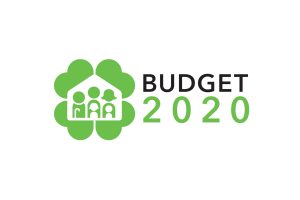Budget 2020 measures are timely and within expectations
The Singapore government has on Tuesday (18 Feb 2020) unveiled a slew of measures that will help the country deal with the novel coronavirus (COVID-19) outbreak, as well as address longer-term global challenges and structural shifts.
Deputy Prime Minister and Minister for Finance Heng Swee Keat on Feb 18 delivered the Singapore Government’s Budget Statement for Financial Year 2020 in Parliament on Tue, 18 February 2020. Budget 2020 is presented against a backdrop of the on-going COVID-19 outbreak, as well as broader uncertainties in the landscape.
There are also long-term structural shifts taking place around the world – a decline in support for globalisation, a shift in economic weight towards Asia, technological disruption, and an ageing population in many countries.
 The Government said that Budget 2020 measures is aimed at immediate concern is to protect Singaporeans from the risk of a further spread of the COVID-19 virus.
The Government said that Budget 2020 measures is aimed at immediate concern is to protect Singaporeans from the risk of a further spread of the COVID-19 virus.
$800 million will be set aside for the Ministry of Health and other ministries to respond to this outbreak. Concurrently, Budget 2020 measures are aimed at concerns on the economy and jobs.
Among the measures, Deputy Prime Minister and Finance Minister Heng Swee Keat said the government will set aside SGD6.4 billion for initiatives in view of the COVID-19 outbreak. Of this sum, a total of SGD5.6 billion will be allocated under two packages – Stabilisation and Support Package, and Care and Support Package – to help mitigate the impact of the virus on businesses and jobs. Meanwhile, SGD800 million will go towards helping frontline agencies fight and contain the outbreak.
Colliers International’s experts look at what these Budget 2020 measures mean for the real estate industry, particularly commercial and industrial property, and tourism sectors.
BUDGET 2020 MEASURES ON COMMERCIAL AND INDUSTRIAL PROPERTY SECTOR
Tricia Song, Head of Research for Singapore, Colliers International:
“Broadly, we think this is a generous budget that is fit for the times, and largely within our expectation. We expect the measures announced should benefit the retail property sector in the near-term and industrial properties over the longer term.
The 15% property tax rebate for qualifying commercial properties should alleviate some concerns among retail mall operators arising from the COVID-19 outbreak, such as declining tenant sales and footfall. (Qualifying commercial properties include: shops (e.g. retail and F&B) including those within hotel buildings; serviced apartment buildings; and the prescribed MICE venues, but do not apply to any premises or a part of any premises used for a residential, industrial or agricultural purpose, or as an office, a business or science park, or a petrol station.)
Colliers Research recommends retail landlords to pass on the savings in the form of
- fit-out incentives during downtime or as direct temporary rent rebates for tenants;
- increased spending on mall hygiene and cleanliness, and/or
- free parking and increased marketing campaigns such as cashback.
In addition, Colliers Research believes the delay in GST hike should encourage more domestic spending at least into 2021, and support retail sales.
The Research, Innovation and Enterprise 2020 Plan, which outlines the government’s investment into artificial intelligence, industrial robotics, urban sustainability and biomedical sciences should benefit the industrial property sector. The additional SGD300 million set aside under the Startup SG Equity should lend more support to deep-tech start-ups, such as those in pharmbio and medtech, advanced manufacturing, and agri-food tech.
We believe the government’s long-term strategic push on electric vehicles (EVs) could have a positive spillover effect on manufacturing sector, pushing up demand for EVs production and other cleaner technologies in the long run.”
BUDGET 2020 MEASURES ON HOTEL/TOURISM SECTOR
Govinda Singh, Executive Director of Valuation and Advisory Services, Colliers International:
“The measures announced in the Budget 2020 to help the tourism sector with operating costs and cash flow are timely and good short-term initiatives. These measures, particularly the property tax rebates and temporary bridging loans, will no doubt help with fixed costs and working capital of the businesses. In addition, the Jobs Support Scheme and enhanced Wage Credit Scheme will help companies better manage their labour cost.
Depending on how protracted the COVID-19 outbreak is going to be, we expect the tourism sector will likely take a significant hit. By our estimation, if the outbreak lasts anything between three and six months, room occupancies could fall by at least 10-15 percentage points (to about 65% occupancy rate) during the period, if not lower depending on how long the fallout is. This will also put pressure on room rates. On that note, we would caution hoteliers against discounting the Average Daily Rate (ADR) too deeply, as this is unlikely to drive demand given the travel curbs that are currently in place, and it could also take much longer to recover these discounts once offered.
Meanwhile, the MICE industry looks unlikely to recover this year, with a large number of events that have already been cancelled or postponed. While some events have been rescheduled to April and beyond, we note that given the fixed capacity of MICE venues in Singapore – which have already been booked for events in the second half of 2020 – it is not feasible to move all the existing events to the latter part of the year.
The government said that it is monitoring the situation and “can and are prepared” to do more if needed. Should the COVID-19 outbreak or indeed other external shocks lead to a severe and prolonged downturn in the tourism sector, we think other measures such as further wage support (for example, a certain percentage contribution/offset for employer’s CPF contribution) to defray labour costs for the hospitality industry would go a long way to protecting jobs. The government could perhaps also explore a temporary cut in GST rate for the travel and tourism trade as well to help businesses manage cost.”







